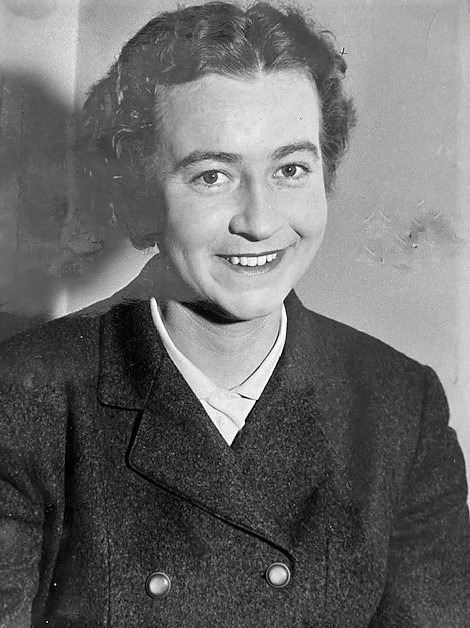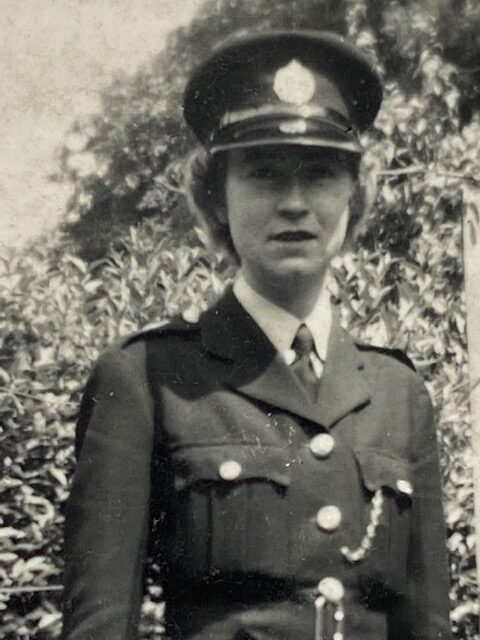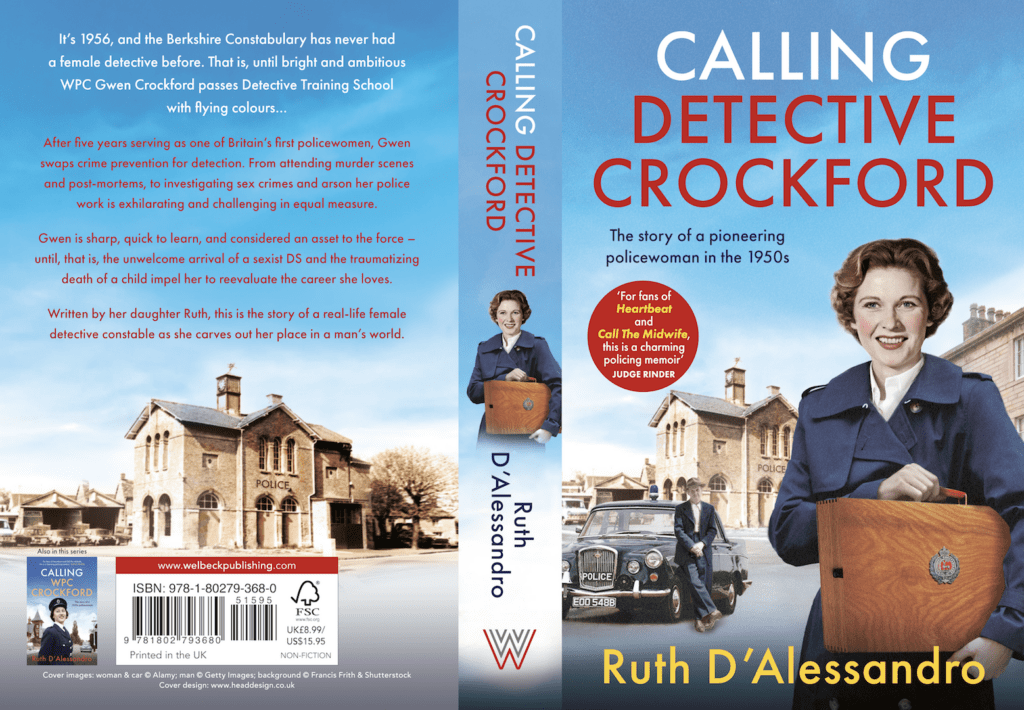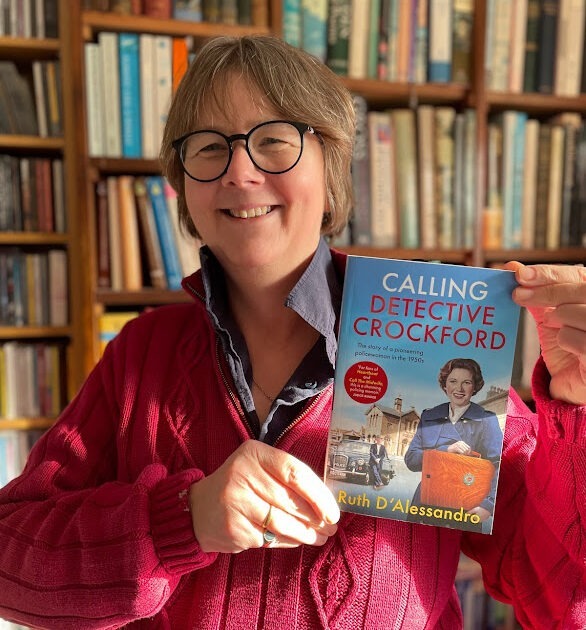When Ruth D’Alessandro left Durham University in 1989 with a degree in Modern Arabic Studies to pursue a career in Publishing in the Middle East, she could hardly have foreseen her future as a writer and expert in women in policing in 1950s parochial Britain…
Yet fast forward almost 35 years, 2 children and a career in publishing and educational writing, Oxted resident Ruth D’Alessandro has published the second part of her policing trilogy, ‘Calling Detective Crockford’, based on the stellar career of her mother, Gwen Crockford, one of Britain’s first female detectives.

The book launch takes place at the Oxted Library on Saturday 18th March (the day before Mother’s Day), 5.30 to 7.30pm. There will be free refreshments and an opportunity to chat to her and buy copies of her book. Ruth will read extracts of her new book ‘Calling Detective Crockford‘ throughout the evening.
Calling Detective Crockford, like its predecessor, Calling WPC Crockford, is ‘creative non-fiction’ and an exceptionally true to life, and often graphic account of her mother’s days in the force. It’s an absorbing memoir that tells the story of a real-life female police detective in post-war Britain, as she navigates a man’s world.
The decision to write about her mother came quite by chance. An experienced educational writer who knew she ‘had a book in her’, Ruth hadn’t decided on a topic that really motivated her… until on International Women’s Day in 2017, she wanted to post on social media about a woman who had inspired her.
“I suddenly thought about my mother,” said Ruth. “After five years serving as one of Britain’s first WPCs in the 1950s, she had become Berkshire’s first female detective in 1956 and had an illustrious career solving crimes across the county. If that isn’t inspirational, I don’t know what is!”

Unfortunately, Ruth’s decision to write her mother’s memoirs came after Gwen had already passed away, and Ruth regretted not having spent more time listening and taking notes.
“I had so many of her stories in my head, but they were all rather fragmented,” said Ruth, whose mother died in 2004. “I spent a lot of time with my mum, just talking about nothing in particular, when I could have sat her down and talked through all her stories in detail.”
Ruth, however started pulling the stories together and pitched them to a couple of publishing houses, but it was a hard sell because they didn’t fall into either the crime fiction or memoir genre. A literary agent, now Ruth’s own agent, Kate Hordern, advised her to make a choice between writing a memoir or crime fiction.
“When I was given the choice of writing about my mother’s experiences, her memoirs if you like, or writing crime fiction, I chose my mother’s experiences”, said Ruth. “But I then had to start researching in earnest to get to grips with the detailed facts of my mother’s cases…


“Sadly, there wasn’t much in the way of police archives or records, but I found that when I went to the British Library and looked up newspaper articles from the time, it was mostly all there in black and white; many of the stories and crimes that my mother worked on had been reported by the local papers. It was an absolute revelation and I think, over the years, through my extensive research, I have become something of an expert on female police officers and female detectives of the 1950s!”
Officially the books are non-fiction but known as ‘creative non-fiction’ because essentially some of Ruth’s mother’s memoirs, experiences and the characters in them need to be fictionalized to a degree for legal reasons.
“The strange thing about writing all the accounts and circumstances of my mother’s experiences, which go from the post war days through to the early 1960s, is that so many of the social and political issues are still relevant today. In some ways, so much has changed, but in others, not so much.”
“Early on in Gwen’s career, the country was still experiencing rationing and at the time of writing the first book in early 2020, we were in the Covid era, with panic buying and shortages, experiencing much of the same as they did in post-war Britain.”
The last place Gwen was stationed later in her career (covered in the final part of the trilogy to be launched next year), was Newbury, near Greenham Common in the days of the Cold War and CND anti-nuclear protests. Everyone at that time had a suspicion of Russia and fear of a nuclear third world war, and it’s not hard to draw parallels to today’s modern conflicts.
As Judge Rinder sums up the book, “For fans of Heartbeat and Call the Midwife, this is a charming police memoir.”
The books are a truly fascinating insight into late 1950s society, and the challenges faced by female police officers at the time. We recommend you read Calling WPC Crockford first, then get a copy of Calling Detective Crockford.
What an amazing tribute to an inspirational and pioneering lady on International Women’s Day and the perfect Mother’s Day present from Ruth to her late mother, Gwendoline Crockford.

Calling Detective Crockford
Why was ‘Smelly Eddie’ Rooke, an itinerant newspaper seller, found dead under Windsor’s railway arches in 1959? Was he a victim of Teddy boy violence? And what was his connection with Windsor’s Brigade of Guards?
Berkshire had never had a female detective before. That is, until bright and ambitious WPC Gwen Crockford passes out of Hendon Detective Training School with flying colours…
After five years serving as one of Britain’s first WPCs, Gwen becomes one of its first female detectives. Swapping crime prevention for detection, she must soon become comfortable with attending murder scenes and post-mortems, investigating sex crimes. and going undercover. Her police work is diverse and challenging: Teddy boy violence, arson, a sex offender ‘war hero’, and solving an unexplained death are all part of her remit.
Gwen is sharp and quick to learn, considered ‘one of the boys’ by her colleagues. Until, that is, the traumatising death of a child, the arrival of a new sexist DS, and near-zero opportunity for promotion force Gwen to re-evaluate her career…
Calling WPC Crockford and Calling Detective Crockford are available from all good bookshops and online.
Published by Welbeck Publishing. RRP £8.99.


